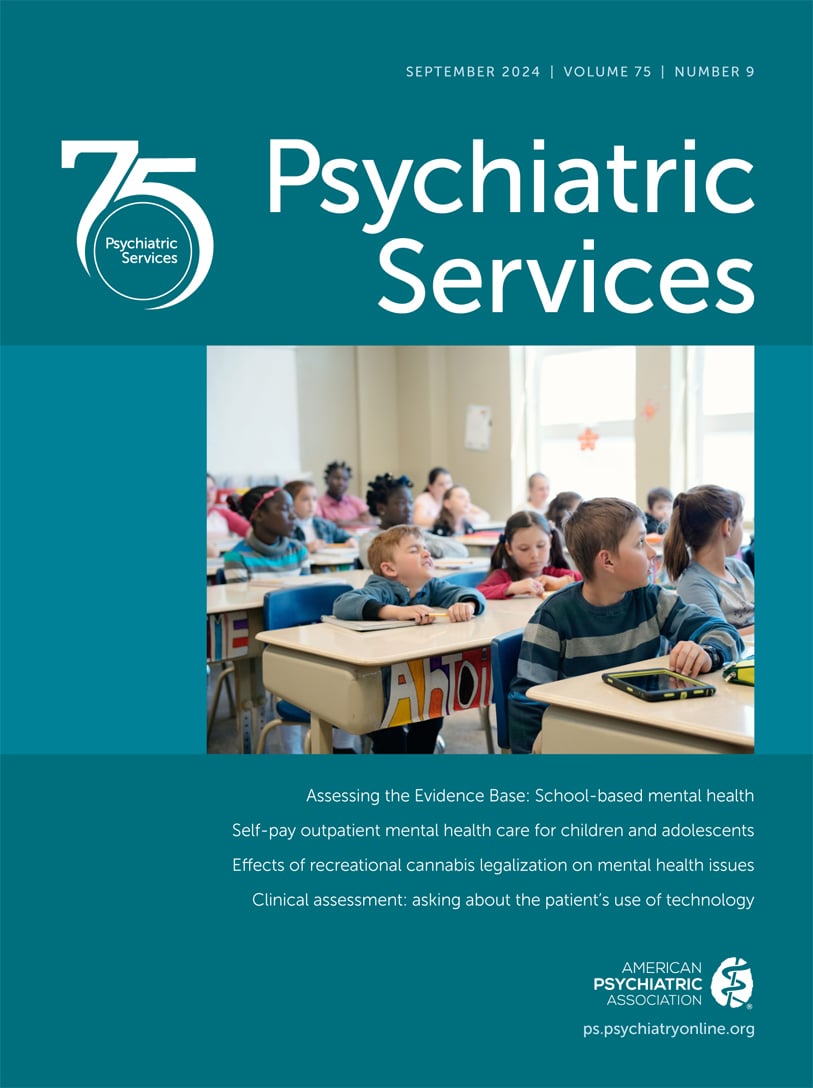Psychiatric Services
- Volume 71
- Number 4
- April 2020
Taking Issue
Viewpoint
Articles
Publication date: 18 December 2019
Pages312–318Objective: The National Committee for Quality Assurance recommends response and remission as indicators of successful depression treatment for the Healthcare Effectiveness and Data Information Set. Effect size and severity-adjusted effect size (SAES) offer ...
https://doi.org/10.1176/appi.ps.201900295Publication date: 04 December 2019
Pages319–327Objective: Despite the interest in technology-enhanced preventive interventions for suicidality, there is minimal peer-reviewed research on conversations of text message hotlines. In this large-scale study, the authors explored distinct classes of users of ...
https://doi.org/10.1176/appi.ps.201900149Publication date: 21 January 2020
Pages328–336Objective: Little is known about the role of primary care safety-net clinics, including federally qualified health centers and rural health clinics, in providing mental health services to youths. This study examined correlates and quality of mental health ...
https://doi.org/10.1176/appi.ps.201800540Publication date: 18 December 2019
Pages337–342Objective: The authors designed this project to identify barriers to using long-acting formulations of antipsychotics. Methods: The authors used a focused ethnographic approach. Patients, psychiatrists, nurses, therapists and administrators were interviewed ...
https://doi.org/10.1176/appi.ps.201900236Publication date: 18 December 2019
Pages343–354Objective: The purpose of this study was to compare, by sexual-minority status, the prevalence of feelings of depression and anxiety as well as use of medication for these feelings. Methods: Data on adults ages 18 years and older (N=79,542) came from the ...
https://doi.org/10.1176/appi.ps.201900219Reviews & Overviews
Publication date: 04 December 2019
Pages355–363The overrepresentation of people with serious mental illness in the criminal justice system is a complex problem. A long-standing explanation for this phenomenon, the criminalization hypothesis, posits that policy changes that shifted the care of people ...
https://doi.org/10.1176/appi.ps.201900453Publication date: 21 January 2020
Pages364–377Objective: There is a critical shortage of clinicians trained in evidence-based treatments (EBTs). New technologies, such as Internet-based training, video conferences, and mobile applications, can increase accessibility to specialized training and enhance ...
https://doi.org/10.1176/appi.ps.201900186Special Article
Publication date: 03 January 2020
Pages378–384Many Latin American countries face the challenge of caring for a growing number of people with severe mental illnesses while promoting deinstitutionalization and community-based care. This article presents an overview of current policies that aim to ...
https://doi.org/10.1176/appi.ps.201900306Brief Reports
Publication date: 11 December 2019
Pages385–388Objective: The rising prevalence of autism spectrum disorder (ASD) underscores the importance of access to evidence-based interventions such as applied behavior analysis (ABA). Anecdotal evidence suggests limitations in the supply of ABA providers, but ...
https://doi.org/10.1176/appi.ps.201900058Publication date: 03 January 2020
Pages389–392Objective: This study examined whether visits to primary care physicians (PCPs) by patients with a primary behavioral health diagnosis were more likely to be associated with referral to another physician and if so, whether the association varied by ...
https://doi.org/10.1176/appi.ps.201900004Publication date: 11 December 2019
Pages393–396Objective: The aim of this study was to examine whether people who screened positive for depression were more likely to have sought treatment if they had personal knowledge of other individuals with emotional or mental problems or of individuals who have ...
https://doi.org/10.1176/appi.ps.201900190Open Forum
Publication date: 30 January 2020
Pages398–400The rate of suicide among veterans continues to be highly problematic. The widespread adoption and mandated implementation of thinly validated and scripted assessment tools have the potential to increase clinician burnout and erode clinician-patient ...
https://doi.org/10.1176/appi.ps.201900482Personal Accounts
Promoting High-Value Mental Health Care
Publication date: 08 January 2020
Pages405–408Hoarding disorder has significant health consequences, including the devastating threat of eviction. In this pilot study, critical time intervention (CTI), an evidence-based model of case management shown to be effective for vulnerable populations, was ...
https://doi.org/10.1176/appi.ps.201900447Law & Psychiatry
Publication date: 01 April 2020
Pages409–411People being held in jails and prisons are entitled under the U.S. Constitution to necessary medical care, including mental health care. Whether such a duty includes planning for care after release has been less clear, despite widespread professional ...
https://doi.org/10.1176/appi.ps.202000084Editor’s Choice
Past Issues
View Issues Archive
Vol. 75 | No. 12

Vol. 75 | No. 11

Vol. 75 | No. 10
